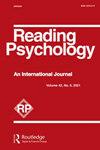Investigating the Effects and Social Validity of an Informational Text Structure Intervention for Reading and Writing in Grades Four and Five
IF 1
Q4 PSYCHOLOGY, EDUCATIONAL
引用次数: 0
Abstract
Abstract The purpose of this study was to investigate the effects and social validity of Read STOP Write, a text structure intervention for reading and writing, in grades four and five. In a cluster randomized trial, 11 teachers in three elementary schools were randomly assigned to deliver Read STOP Write or RARE Reading & Writing, an alternative treatment focused on question answering. In total, 160 students received Read STOP Write, and 191 students received RARE Reading & Writing. Data included pretest and posttest measures of students’ informational text structure identification, reading comprehension, and writing quality, and interviews to understand teachers’ perceptions of the social validity of the interventions. Student measures were analyzed using three-level hierarchical linear modeling. Teacher interviews were analyzed qualitatively using typological analysis. Results indicated that students who received Read STOP Write outperformed students who received RARE Reading & Writing on a researcher-developed measure of informational writing quality with promising effects on measures of informational text structure identification and reading comprehension skills but no effects on standardized measures of general reading comprehension or writing quality. Teacher interviews revealed that teachers perceived the goals, procedures, and effects of both interventions as socially valid. Implications for research and practice are discussed.信息文本结构干预对四、五年级学生阅读和写作的效果和社会效度调查
摘要本研究旨在探讨四年级和五年级学生阅读和写作文本结构干预的效果和社会效度。在一项集群随机试验中,三所小学的11名教师被随机分配到提供Read STOP Write或RARE Reading & Writing,这是一种侧重于问答的替代治疗。总共有160名学生接受了Read STOP Write, 191名学生接受了RARE Reading & Writing。数据包括学生信息文本结构识别、阅读理解和写作质量的测试前和测试后测量,以及了解教师对干预措施的社会有效性的看法的访谈。采用三级层次线性模型对学生测量进行分析。使用类型分析对教师访谈进行定性分析。结果表明,在研究人员开发的信息写作质量测量中,接受Read STOP Write的学生表现优于接受RARE Reading & Writing的学生,对信息文本结构识别和阅读理解技能的测量有希望产生影响,但对一般阅读理解或写作质量的标准化测量没有影响。教师访谈显示,教师认为两种干预的目标、程序和效果都是社会有效的。讨论了对研究和实践的启示。
本文章由计算机程序翻译,如有差异,请以英文原文为准。
求助全文
约1分钟内获得全文
求助全文
来源期刊

Reading Psychology
PSYCHOLOGY, EDUCATIONAL-
CiteScore
2.20
自引率
7.10%
发文量
28
期刊介绍:
Prepared exclusively by professionals, this refereed journal publishes original manuscripts in the fields of literacy, reading, and related psychology disciplines. Articles appear in the form of completed research; practitioner-based "experiential" methods or philosophical statements; teacher and counselor preparation services for guiding all levels of reading skill development, attitudes, and interests; programs or materials; and literary or humorous contributions.
 求助内容:
求助内容: 应助结果提醒方式:
应助结果提醒方式:


